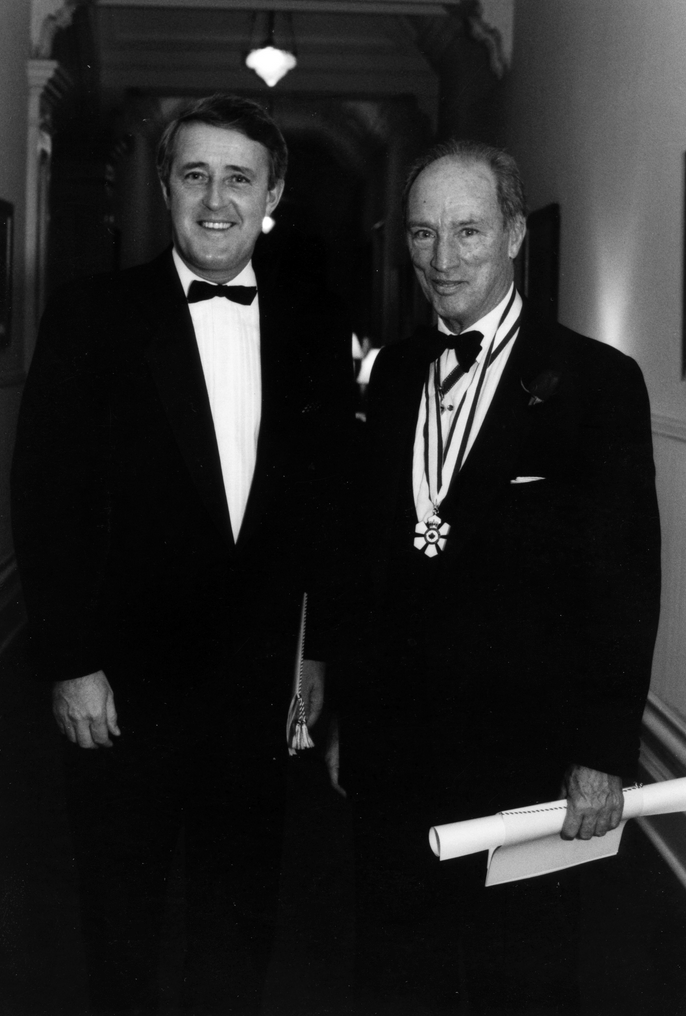Farewell to a Leader of Big, Bold Ideas

Brian Mulroney with Pierre Trudeau at Rideau Hall, 1985/Bill McCarthy
By Martin Goldfarb
March 3, 2024
For 20 years, I was the official pollster and an election strategist for the Liberal Party of Canada. From my experience, we won elections when we had the big ideas and we lost when the Conservatives had the big ideas. Winning elections is about winning affinity with voters by creating the promise of a bold, new direction for the country — a direction where the people see a clear path to a better future.
In Canada, we’ve had great leaders who changed not only how we thought of ourselves, but who we aspired to be. Sir John A. Macdonald led the charge for a transcontinental railway. Sir Wilfrid Laurier brought us into the 20th century and sought to inspire us to greatness.
I was closely associated with Pierre Trudeau, and I have thought of him and his legacy recently as we just marked the 40th anniversary of his famous ‘walk in the snow’. I was the last person who spoke with him before that walk in the snow. I told him he could win, but he decided it was time to go. Personally, I would have relished a Trudeau-Mulroney head-to-head contest.
Pierre Trudeau accomplished much. His big ideas included multiculturalism, patriation of the Constitution, and the National Energy Program (NEP), which resulted in the creation of Petro-Canada. Though the NEP was obviously unpopular in Alberta and the west, it led to the development of the offshore in Atlantic Canada.
Trudeau’s successor, John Turner, was a good man, but the young Progressive-Conservative leader Brian Mulroney was the man for the moment. Mulroney won big — the biggest federal electoral victory in Canadian history.
Brian Mulroney was incredibly successful because, like Pierre Trudeau, he was a bold, bet-the-house, big ideas guy.
Initially an opponent of free trade, once in office, Brian Mulroney borrowed a page from former Trudeau cabinet minister Ed Lumley, who had been pursuing early free trade talks with the Americans in secret. Mulroney pushed, for and concluded, the Free Trade Agreement (FTA) with President Ronald Reagan. It was an extremely brave move on Mulroney’s part, and it resulted in the restructuring of many manufacturing industries, especially in Ontario. Free trade changed the way we thought about ourselves and our way of doing business. Ultimately, it led to enormous wealth generation on both sides of the border. My own market research business expanded tremendously.
Brian Mulroney was incredibly successful because, like Pierre Trudeau, he was a bold, bet-the-house, big ideas guy.
Similarly, he scrapped the hidden 13.5% Manufacturers’ Sales Tax (MST), and replaced it with the highly visible and politically charged 7% Goods and Services Tax (GST), which changed the revenue base for Ottawa. It was the precursor that allowed successive Liberal governments to achieve balanced budgets, which put Canada on a stable financial footing – the strongest in the G7 — and gave business the confidence to invest. Short-term pain for long-term gain was a hallmark of Mulroney’s time in office.
I studied Mulroney carefully, but at a distance, from the mid 1970s. I got to know him in his post-political life. In 2012, he reached out to me and invited me to lunch at the Toronto Club. When we sat down, he whispered that neither of us — he Irish Catholic and me Jewish — would have been allowed in the club a generation earlier. We reminisced, we talked about our kids and grandkids, and we laughed. It was a wonderful, deep, engaging discussion that I will never forget.
In his post-political career, Mulroney remained active, always in the arena — whether advising Prime Minister Justin Trudeau on renegotiating free trade with Donald Trump or speaking out on important issues like antisemitism. On the latter, his speech to the World Jewish Congress, when he accepted the Theodor Herzl Award weeks after the heinous Hamas attack on innocent Israelis, was a profoundly important statement.
Mulroney said, “Contemporary antisemitism has added the State of Israel to its list of targets. Israel has become the new Jew. Stripped of its intellectual pretensions, of the cloak of human rights, these ritual denunciations of Israel with which we have become all too familiar are a pernicious form of racism.” He went on, “In the final analysis, Jews are our fellow citizens; they are our friends; they are our neighbours. And this is their home. But until they feel safe and accepted, it will never, in any complete sense, be home for anyone.”
Powerful words from a good friend and staunch ally of the Jewish people.
I sent that speech to my children and grandchildren and said it was a must-read. My grandson Jacob, who had developed a decade-plus friendship with the former prime minister and G7 leader, sent Mulroney a note about the speech. Mulroney immediately picked up the phone and called Jacob. He wanted to make sure that my grandson knew that he and the Jewish community were not alone.
Pierre Trudeau and Brian Mulroney were very different men — Trudeau an introvert and Mulroney an extrovert par excellence — but they won majority governments because they promised and delivered major, positive changes in the daily lives of Canadians. Neither were loved when they left office, but both men had deep convictions. Both believed in their ideas. Both believed in Canada, and in the hopeful promise of Canada. Both were passionate advocates for a better Canada. Both gave us confidence in ourselves. Both, I firmly believe, will go down as two of the very greatest prime ministers in Canadian history, and Mulroney will be remembered as the most consequential Canadian on the global stage.
Martin Goldfarb, who spent 20 years as pollster and strategist for the Liberal Party of Canada, is Co-Founder & Chairman of Almada Investments in Toronto.
